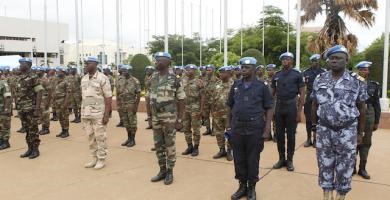 Two weeks before the first round of Mali's presidential election takes place, the United Nations and France signed an agreement July 13 that outlines the separate responsibilities of the U.N. peacekeepers and French troops already operating in the country, as well as the nature of their cooperation. While U.N. forces now bear the primary responsibility for securing northern Mali, the agreement shows that France's role is still quite significant. French troops will be called upon to intervene anytime and anywhere U.N. troops are unable to directly deal with a threat, as opposed to the original plan that would have had French forces in a logistical support role.
Two weeks before the first round of Mali's presidential election takes place, the United Nations and France signed an agreement July 13 that outlines the separate responsibilities of the U.N. peacekeepers and French troops already operating in the country, as well as the nature of their cooperation. While U.N. forces now bear the primary responsibility for securing northern Mali, the agreement shows that France's role is still quite significant. French troops will be called upon to intervene anytime and anywhere U.N. troops are unable to directly deal with a threat, as opposed to the original plan that would have had French forces in a logistical support role.
The U.N. mission in Mali comprises 6,200 African security personnel, part of the original contingent that participated in the French-led intervention in northern Mali. France continues to deliver logistical support to these African forces, just as it did during the offensive phase of the intervention, even though France is not a party to the current U.N. mandate in the country.
While most of the 3,200 French troops still operating in Mali have moved out of key populated locations, they continue to carry out operations against small pockets of militants belonging to al Qaeda in the Islamic Maghreb or the Movement for Unity and Jihad in West Africa. The presence of two separate international forces operating within the same territory brought about the need to define the mission of each and spell out the ways in which they interact. Under the agreement, France will continue to offer logistical support to the countries whose troops make up the U.N. force, just as it did before those countries operated under a U.N. mandate. If U.N. forces request assistance, French troops will intervene using any means necessary.
With this agreement, the United Nations is effectively circumventing its own mandate and rules of engagement by allowing the French to conduct combat operations without them having to adhere to the same limitations and constraints of the African forces. This unconventional approach likely stems from the fact that the peacekeepers are facing a more complex militant threat than in most peacekeeping operations, compelling them to employ the French to project firepower that U.N. forces, under their mandate, typically cannot.
The U.N. secretary general still would have to grant permission to call on the French for support. However, French troops are not limited in their selection of the weapons systems they use to respond to a threat. For example, France could call for heavy weapons and airstrikes, whereas U.N. rules of engagement often demand specific permission from the U.N. Security Council to do this. France is also allowed to call on troops located outside of Mali, such as those based in Chad, the Ivory Coast or even France itself. This provision could become especially important once France withdraws additional troops from Mali -- its smaller remaining force in Mali will retain its recourse to air assets and ground forces located across the region.
France, which has already withdrawn a quarter of the troops it originally deployed to Mali, plans to maintain current troop levels through the Malian presidential election, the first round of which is set for July 28. The results of the vote will go a long way toward defining the trajectory of Malian political stability and of reconciliation efforts between Bamako and the populations of northern Mali.
U.N. forces are responsible for security during the stabilization process. At present, slightly more than half of the allowed military personnel -- 6,200 out of a possible 11,200 troops -- are in Mali. Even at this level, the troops are capable of continuing to secure population centers. Militant attacks in the cities or against security forces throughout the country have not occurred in recent months. Jihadist elements likely retain a limited capability to conduct attacks in Mali, and the presidential election, as well as persistent frictions between the Malian military and northern Mali's Arab and Tuareg populations, continue to pose security threats. Nevertheless, U.N. security forces, backed by the prospect of French intervention, are likely capable of guaranteeing the required level of security to facilitate the stabilization process taking place in Mali. Remaining French forces in Mali, supported by French assets across the region, will also continue to operate in a combat role as the French withdraw after Malian elections.
Courtesy : Stratfor (www.stratfor.com)